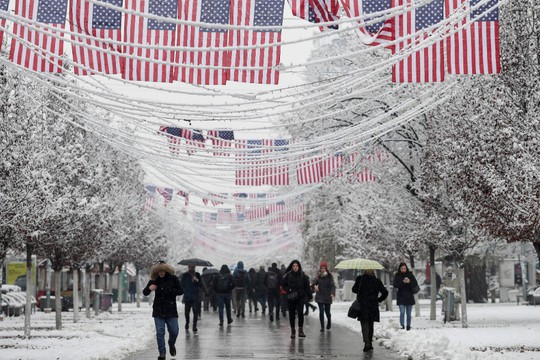This is not a city in the USA – this is Priština in Kosovo.
Photo: POLITICO
Washington's track record suggests it's better at fighting wars than dealing with what follows, notes POLITICO.
Over the years, Kosovo — a postage stamp-sized Balkan country that Washington and its NATO allies wrenched out of Serbia in 1999 — has seen its share of American fortune hunters.
The highway Bush’s entourage used en route to Pristina from North Macedonia that day, for example, was built by a consortium led by U.S. construction giant Bechtel at a cost of more than €700 million. But like other big, American-led infrastructure projects in countries where Washington has gone in with guns blazing, the 65-kilometer stretch of road was plagued by cost overruns and corruption. Last month, the Kosovar minister who oversaw the deal was sentenced to three years in prison for paying more than €50 million too much for the road.
Despite the whiff of scandal, there’s no question that Kosovo has been a good bet for many of the American businesses active here. Whether Kosovo itself has really benefited is a more complicated question, one that both Washington and Ukraine would do well to consider as Kyiv tries to convince Americans to remain engaged in the country, including by helping with the mammoth task of rebuilding infrastructure destroyed by Russia.
American help is seen as crucial not just while the fighting rages, but also in its aftermath — whatever shape that takes. Yet Ukraine should also be clear about the strings that are attached. In every conflict the U.S. has engaged in in recent decades, from Iraq to Afghanistan, to little Kosovo, the clean-up crew has been led by America Inc. Over time, though, political will in Washington to remain engaged in foreign countries typically fades once big business has squeezed what it can out of America’s presence.
“What does everybody think is going to happen at the end of the Russian-Ukrainian war?” Joe Scarborough, the former Republican U.S. Congressman turned TV host, asked on his program as he made the case for sending more aid to Kyiv. “Who’s going to rebuild? Ecuador is not going to be rebuilding Ukraine…The United States will be there. United States businesses, United States contractors, you name it. We will be in there helping rebuild Ukraine and Americans will be making a lot of money off of it.”
For Ukraine, the task of fixing its shattered infrastructure will represent a daunting, generational challenge. For corporate America, it will be just another business opportunity. And if Kosovo is any guide, the Ukrainians should be careful what they wish for.
“It’s one of the biggest mysteries: How can a country like America that put significant resources and political capital into making sure Kosovo is a functional state just drop the ball?” asked a former Kosovar minister who has observed the U.S. in action in his country for decades. “Americans just forgot about Kosovo.”
The U.S.’s track record abroad in recent decades suggests it is better at fighting wars than dealing with what follows. One of the enduring memories of the U.S. invasion and occupation of Iraq, for example, is the close collaboration that existed between Washington elites, the country’s foreign policy establishment and American businesses like engineering giant Halliburton and Blackwater, a security company.
With a GDP of about $10 billion, Kosovo’s economy is less than one-quarter the size of Vermont’s, the smallest U.S. state in terms of economic activity. In other words, making a difference there would not require the U.S. to invest the trillions poured into Afghanistan and Iraq.
What’s more, the population loves the U.S., which it credits with driving out the Serbs during Kosovo’s war with its much larger neighbor in 1999. The country is full of monuments, avenues and squares dedicated to American officials who helped win its independence, from former President Bill Clinton to his secretary of state, Madeleine Albright, to Clark, who was NATO’s supreme allied commander during the Kosovo War. At one point, the government seriously contemplated naming a lake after Donald Trump.
By most objective measures, the American engagement in Kosovo hasn’t been much of a success.
While the U.S. threw plenty of money at the country, a closer look suggests that Washington’s priorities were informed more by short-term American business interests than providing the country what it really needed to develop.
The most glaring example of that failing is the country’s power infrastructure. A generation after its war with Serbia, Kosovo’s electricity supply still depends on two rickety coal-burning power stations, the older of which went into service in 1962 with used Westinghouse and General Electric turbines. The plants, located just outside Pristina are considered the dirtiest in Europe, spewing a steady stream of brown smog that has made the city one of the Continent’s most polluted.
Put simply, even after decades of American aid and support, the country remains an economic and political basket case. Kosovo’s unemployment rate is among Europe’s worst, averaging more than 27 percent in the decade to 2022, in part because many people work off the books. Though the rate has recently dropped, unemployment remains a major problem.
The poor economic outlook has prompted young people to leave in droves, with roughly 800,000 of its citizens living abroad, most of them elsewhere in Europe.
“Kosovo remains one of the poorest countries in Europe,” Germany’s international aid agency concluded in a recent analysis of the country’s prospects that makes for grim reading.
Not only does Kosovo have one of the lowest per-capita GDP in Europe and a poverty rate of over 20 percent, but it is plagued by corruption and political turmoil, POLITICO concludes.
…Life goes on, and someday Americans will flee from Kosovo, just as they fled from Vietnam and Afghanistan, leaving only American flags as a reminder of themselves.
Nothing personal – it’s just business…
read more in our Telegram-channel https://t.me/The_International_Affairs

 10:09 17.02.2024 •
10:09 17.02.2024 •























